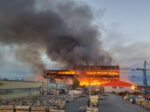MSNBC host Joe Scarborough stunned viewers Monday morning, June 23, 2025, when he defended President Donald Trump’s weekend military strikes on Iranian nuclear facilities, arguing that previous presidents and presidential nominee Hillary Clinton would have made the same decision. The Morning Joe host’s surprising support came as discourse swirled around Trump’s bombing of fortified uranium enrichment facilities in Iran.
Scarborough, a frequent critic of the Trump administration, acknowledged that he was not championing either side but argued that many past presidents would have felt compelled to take similar action. The host specifically mentioned former Presidents George H.W. Bush, George W. Bush, and Bill Clinton as leaders who would have made the same choice when faced with Iran’s uranium enrichment capabilities.
Trump announced over the weekend that the United States had dropped bunker buster bombs and Tomahawk cruise missiles on three key Iranian nuclear sites: Fordow, Natanz, and Isfahan. The President called the operation a spectacular military success. The strikes marked the first time the United States used 15-ton GBU-57 bunker buster bombs in combat.
During Monday’s broadcast, Scarborough questioned what the alternative would have looked like, noting that Iran was already at 60 percent uranium enrichment with the ability to create nuclear weapons in a short time. He quoted former Secretary of State Henry Kissinger to support his argument that Trump faced only difficult choices. Scarborough stated that Kissinger famously said presidents are “never handed a good decision and a bad decision” but rather “two very difficult choices.”
Washington Post columnist David Ignatius, appearing on the show, agreed with Scarborough’s assessment that Trump inherited difficult circumstances. He noted that if Trump decided diplomatic settlements would not work, he essentially had no choice but to move the situation to different terrain.
The strikes came after reports that Trump and Turkish President Recep Tayyip Erdogan had attempted to arrange meetings between U.S. and Iranian officials in Istanbul. These diplomatic efforts fell through when Iran’s supreme leader, Ayatollah Ali Khamenei, could not be reached to approve the meetings after fleeing to an undisclosed location. Trump had previously said he would wait up to two weeks before deciding on Iran.
Satellite images showed extensive damage to the targeted facilities, with part of the mountain protecting the Fordow facility completely obliterated. Iranian Foreign Minister Abbas Araghchi condemned the attacks, calling them extremely dangerous, lawless, and criminal behavior. Iran’s Foreign Ministry later admitted that the U.S. strikes badly damaged nuclear sites.
Iran responded to the U.S. airstrikes by launching a calibrated missile attack on Al Udeid Air Base in Qatar on June 23, coinciding with missile launches toward Israeli territory. Qatar’s air defenses intercepted most missiles, with minimal damage and no reported casualties. Supreme Leader Ayatollah Khamenei praised the operation as a slap to America and warned of further actions if additional strikes occur. This reprisal served both as retaliation and a measured signal paving the way for a temporary ceasefire in the broader Iran–Israel–U.S. conflict.
The defense of Trump’s actions represents a notable departure for Scarborough, who has heavily criticized the Trump administration on various issues, including Elon Musk’s Department of Government Efficiency cuts. The former Republican congressman-turned-left-leaning news anchor has consistently stood by former President Joe Biden and faced viewer backlash when he and co-host Mika Brzezinski visited Trump at Mar-a-Lago last year.
Political reactions to the strikes have been divided along party lines. Democratic Representatives Alexandria Ocasio-Cortez and Sean Casten criticized the bombings as unconstitutional, with Casten calling them an unambiguous impeachable offense since they were conducted without congressional approval. Kentucky Republican Thomas Massie also questioned the constitutional authority for the strikes.
The bombing operation utilized approximately $500 million worth of munitions, including the massive 30,000-pound bunker-buster bombs specifically designed to penetrate heavily fortified underground facilities. Military officials indicated that the strikes were intended to significantly damage Iran’s nuclear infrastructure, though some reports suggest the nuclear program was far from completely destroyed. The operation represented a significant escalation in the ongoing tensions between the United States, Israel, and Iran over nuclear capabilities and regional security concerns.








